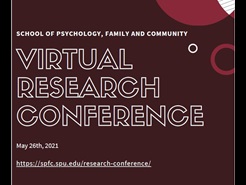Faculty Sponsor(s)
Joel Jin
Presentation Type
Event
Project Type
Completed qualitative research study
Primary Department
Clinical Psychology
Description
Intrinsic religiosity is a focus on religion for its own sake versus extrinsic religiosity, which focuses on religion for is perceived benefits (Cohen et al., 2017). God perfectionism is an external source of perfectionism that is perceived to come from a higher power, or God (Wang et al., 2018). God perfectionism includes both adaptive (perceived standards from God) and maladaptive (perceived discrepancy from God) components. Maladaptive God perfectionism has been used as a mediator between intrinsic religiosity and negative mood, with higher levels of intrinsic religiosity predicting lower levels of negative mood. Due to this correlation, we hypothesized that God perfectionism is a causal pathway of intrinsic religiosity improving life satisfaction, and that it does so due to higher standards from God. College students (N = 125, 44% male, 56% female) from a primarily Protestant Christian sample were surveyed using the Perceived Perfectionism from God Scale (PPG) which includes two subscales; Perceived Standards from God and Perceived Discrepancy from God, the Duke University Religion Index (DUREL), and the Satisfaction with Life Scale (SWLS). A parallel mediation analysis indicated that intrinsic religiosity predicts life satisfaction (b = .33, p = .0183). Furthermore, intrinsic religiosity was indirectly related to life satisfaction through perceived discrepancy from God (b = .13 CI = .02 to .32), but not perceived standards from God (b = -.01, CI = -.07 to .02). Intrinsic religiosity was negatively associated with perceived discrepancy from God (a1 = -.53, p = .003), and consequently discrepancy was associated with less life satisfaction (b1 = -0.25; p = .002). When considering the indirect effect through both mediators, intrinsic religiosity was not significantly associated with life satisfaction (c’ = .21, p =.14). Results illustrate how intrinsic religiosity can affect life satisfaction based on one’s personal perception of God’s standards and discrepancies. Implications of these findings could lead to further research on what aspects of religiosity contribute to standards or discrepancy from God and could conceivably lead to the development of future interventions focused on reducing maladaptive God perfectionism.
Copyright Status
http://rightsstatements.org/vocab/InC/1.0/
Additional Rights Information
Copyright held by author(s).
Included in
God Perfectionism as a Mediator of Intrinsic Religiosity and Life Satisfaction
Intrinsic religiosity is a focus on religion for its own sake versus extrinsic religiosity, which focuses on religion for is perceived benefits (Cohen et al., 2017). God perfectionism is an external source of perfectionism that is perceived to come from a higher power, or God (Wang et al., 2018). God perfectionism includes both adaptive (perceived standards from God) and maladaptive (perceived discrepancy from God) components. Maladaptive God perfectionism has been used as a mediator between intrinsic religiosity and negative mood, with higher levels of intrinsic religiosity predicting lower levels of negative mood. Due to this correlation, we hypothesized that God perfectionism is a causal pathway of intrinsic religiosity improving life satisfaction, and that it does so due to higher standards from God. College students (N = 125, 44% male, 56% female) from a primarily Protestant Christian sample were surveyed using the Perceived Perfectionism from God Scale (PPG) which includes two subscales; Perceived Standards from God and Perceived Discrepancy from God, the Duke University Religion Index (DUREL), and the Satisfaction with Life Scale (SWLS). A parallel mediation analysis indicated that intrinsic religiosity predicts life satisfaction (b = .33, p = .0183). Furthermore, intrinsic religiosity was indirectly related to life satisfaction through perceived discrepancy from God (b = .13 CI = .02 to .32), but not perceived standards from God (b = -.01, CI = -.07 to .02). Intrinsic religiosity was negatively associated with perceived discrepancy from God (a1 = -.53, p = .003), and consequently discrepancy was associated with less life satisfaction (b1 = -0.25; p = .002). When considering the indirect effect through both mediators, intrinsic religiosity was not significantly associated with life satisfaction (c’ = .21, p =.14). Results illustrate how intrinsic religiosity can affect life satisfaction based on one’s personal perception of God’s standards and discrepancies. Implications of these findings could lead to further research on what aspects of religiosity contribute to standards or discrepancy from God and could conceivably lead to the development of future interventions focused on reducing maladaptive God perfectionism.



Comments
This poster was also presented at WPA